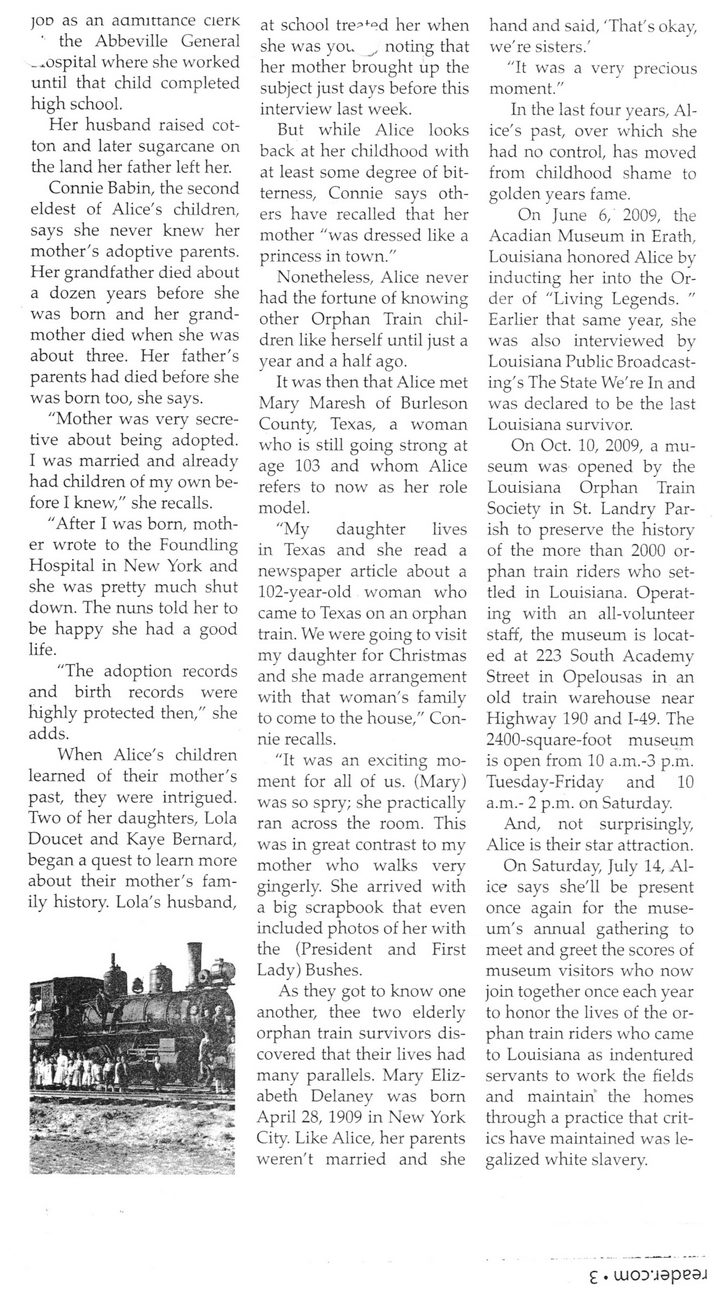This text was obtained via automated optical character recognition.
It has not been edited and may therefore contain several errors.
jod as an admittance cierK the Abbeville General .^ospital where she worked until that child completed high school. Her husband raised cotton and later sugarcane on the land her father left her. Connie Babin, the second eldest of Alice's children, says she never knew her mother's adoptive parents. Her grandfather died about a dozen years before she was bom and her grandmother died when she was about three. Her father's parents had died before she was born too, she says. "Mother was very secretive about being adopted. I was married and already had children of my own before I knew," she recalls. "After I was bom, mother wrote to the Foundling Hospital in New York and she was pretty much shut down. The nuns told her to be happy she had a good life. "The adoption records and birth records were highly protected then," she adds. When Alice's children learned of their mother's past, they were intrigued. Two of her daughters, Lola Doucet and Kaye Bernard, began a quest to learn more about their mother's family history. Lola's husband, at school treked her when she was you _/, noting that her mother brought up the subject just days before this interview last week. But while Alice looks back at her childhood with at least some degree of bitterness, Connie says others have recalled that her mother "was dressed like a princess in town." Nonetheless, Alice never had the fortune of knowing other Orphan Train children like herself until just a year and a half ago. It was then that Alice met Mary Maresh of Burleson County, Texas, a woman who is still going strong at age 103 and whom Alice refers to now as her role model. "My daughter lives in Texas and she read a newspaper article about a 102-year-old woman who came to Texas on an orphan train. We were going to visit my daughter for Christmas and she made arrangement with that woman's family to come to the house," Connie recalls. "It was an exciting moment for all of us. (Mary) was so spry; she practically ran across the room. This was in great contrast to my mother who walks very gingerly. She arrived with a big scrapbook that even included photos of her with the (President and First Lady) Bushes. As they got to know one another, thee two elderly orphan train survivors discovered that their lives had many parallels. Mary Elizabeth Delaney was born April 28, 1909 in New York City. Like Alice, her parents weren't married and she hand and said, 'That's okay, we're sisters.' "It was a very precious moment." In the last four years, Alice's past, over which she had no control, has moved from childhood shame to golden years fame. On June 6, 2009, the Acadian Museum in Erath, Louisiana honored Alice by inducting her into the Order of "Living Legends. " Earlier that same year, she was also interviewed by Louisiana Public Broadcasting's The State We're In and was declared to be the last Louisiana survivor. On Oct. 10, 2009, a museum was opened by the Louisiana Orphan Train Society in St. Landry Parish to preserve the history of the more than 2000 orphan train riders who settled in Louisiana. Operating with an all-volunteer staff, the museum is located at 223 South Academy Street in Opelousas in an old train warehouse near Highway 190 and 1-49. The 2400-square-foot museum is open from 10 a.m.-3 p.m. Tuesday-Friday and 10 a.m.- 2 p.m. on Saturday. And, not surprisingly, Alice is their star attraction. On Saturday, July 14, Alice says she'll be present once again for the museum's annual gathering to meet and greet the scores of museum visitors who now join together once each year to honor the lives of the orphan train riders who came to Louisiana as indentured servants to work the fields and maintain the homes through a practice that critics have maintained was legalized white slavery. £. wcoMapeaj

Orphan Train Riders of BSL Document (159)